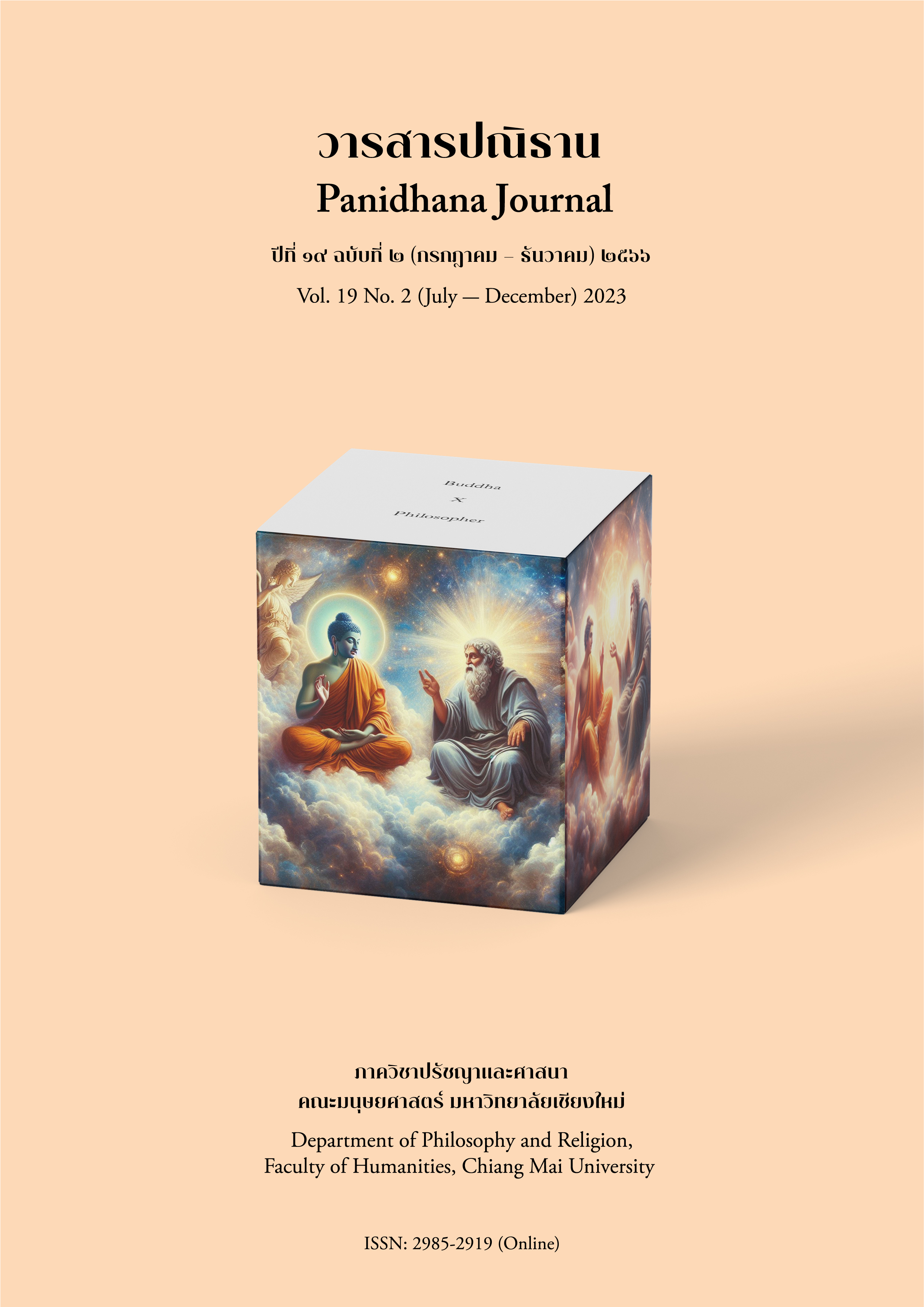ข้อวิจารณ์ของยูริโกะ ไซโตะว่าด้วยทรรศนะเกี่ยวกับความงามของคานท์
คำสำคัญ:
สุนทรียศาสตร์, สุนทรียศาสตร์ในทุก ๆ วัน, ความงาม, คานท์, ไซโตะบทคัดย่อ
ระหว่างศตวรรษที่ 19 การถกเถียงเกี่ยวกับสุนทรียศาสตร์ได้แสดงให้เห็นความโน้มเอียงต่อขอบเขตของศิลปะอย่างชัดเจน โดยลดทอนการถกเถียงเกี่ยวกับทฤษฎีทัศนคติเกี่ยวกับสุนทรียศาสตร์ แนวคิดสุนทรียศาสตร์ทุก ๆ วันชีวิตประจำวันเป็นวิถีที่มุ่งเป้าที่การขยายขอบเขตในการถกเถียงเกี่ยวกับสุนทรียศาสตร์โดยครอบคลุมวัตถุและกิจกรรมที่หลากหลายภายในชีวิตประจำวัน ยูริโกะ ไซโตะ นักปรัชญาคนสำคัญแห่งช่วงต้นศตวรรษที่ 20 เป็นผู้มีส่วนร่วมสำคัญต่อการพัฒนาของสาขาสุนทรียศาสตร์ทุก ๆ วัน โดยเฉพาะอย่างยิ่งการปฏิเสธแนวคิดเรื่องความงามของอิมมานูเอล คานท์ บทความวิจัยนี้มีจุดมุ่งหมายในการ (1) นำเสนอข้อวิจารณ์ของไซโตะเกี่ยวกับทัศนะเกี่ยวกับความงามของคานท์ และ (2) เปรียบเทียบทัศนะเกี่ยวกับความงามของคานท์กับข้อถกเถียว่าด้วยสุนทรียศาสตร์ของไซโตะ โดยความงามนั้นมีความโดดเด่นในแนวคิดสุนทรียศาสตร์ของคานท์ซึ่งไซโตะไม่ได้ให้ความสำคัญเท่า ทางผู้วิจัยตั้งสมมุติฐานว่านอกจากความแตกต่างระหว่างแนวคิดแล้วยังรวมถึงหลักการพัฒนาแนวคิดด้วย ซึ่งทางผู้วิจัยได้อภิปรายเกี่ยวกับสุนทรียศาสตร์ระหว่างคานท์และไซโตะในบทความนี้ด้วย
เอกสารอ้างอิง
Adorno, T. W. (1977). Aesthetic Theory. (R. Hullot-Kentor, Trans.). Athlone Press. (Original work published 1970).
Danto, A. C. (2002). The Abuse of Beauty. Daedalus, 131(4), 35–56. http://www.jstor.org/stable/20027805
Dewey, J. (1980). Art as Experience. Perigee Books.
Duncum, P. (1999). A case for an art education of everyday aesthetic experiences. Studies in Art Education 40(4), 295-311. https://doi.org/10.2307/1320551
Guyer, P. (1994). Kant's Conception of Fine Art. The Journal of Aesthetics and Art Criticism 52(4), 275-285.
Hilgers, T., (2017). Aesthetic Disinterestedness Art, Experience, and the Self. Routledge. https://doi.org/10.4324/9781315696089
Holgate, S., (2020, February 17). Hegel’s Aesthetics. https://plato.stanford.edu/entries/hegel-aesthetics/
Horvath, G. (2018, October 3-6). The Modern Paradigm of Art and Its Frontiers. International Multidisciplinary Congress PHI 2018: „Modernity: Frontiers and Revolutions, Ponta Delgada, Portugal.
Kant, I. (1987). Critique of Power of Judgment. (W. Pluhar, Trans.). Library of congress cataloguing in Publication Data (Original work published 1790).
Kreitman, N. (2006). The Varieties of Aesthetic Disinterestedness. Contemporary Aesthetics, 4(18).
Leddy, T. (2021, January 24). Dewey’s Aesthetics. https://plato.stanford.edu/entries/dewey-aesthetics/
Li & Taylor (2018). On Aesthetic Disinterestedness [master’s thesis, The University of Edinburgh]. Edinburgh Research Archive. http://hdl.handle.net/1842/35655
Light, A., & Smith, J. M., (2005). The Aesthetics of Everyday Life. Columbia University Press. https://doi.org/10.1177/17499755080020030708
Meine, C., (2010). Aldo Leopold His Life and Work. The University of Wisconsin Press. https://doi.org/10.2307/3984442
Saito, Y. (1997). The Japanese Aesthetics of Imperfection and Insufficiency. The Journal of Aesthetics and Art Criticism, 55(4), 377-385.
Saito, Y. (1999). Japanese Aesthetics of Packaging. The Journal of Aesthetics and Art Criticism, 57(2), 257-265.
Saito, Y. (2007). Everyday Aesthetics. Oxford University Press. https://doi.org/10.1093/acprof:oso/9780199278350.001.0001
Saito, Y. (2012). Everyday Aesthetics and World-Making. Contrastes Revista Internacional de Filosofía 25(3), 255-274, http://dx.doi.org/10.24310/Contrastescontrastes.v25i3.11567
Saito, Y. (2019, November 18). Aesthetics of the Everyday. https://plato.stanford.edu/entries/aesthetics-of-everyday/
Tatarkiewicz, W. (1963), Objectivity and Subjectivity in the History of Aesthetics. Philosophy and Phenomenological Research, 24(2), 157-173.
Thomson, I. (2019, August 6). Heidegger’s Aesthetics. https://plato.stanford.edu/entries/heidegger-aesthetics/
Walton, K. L. (1970). Categories of Art. The Philosophical Review, 79(3), 334–367. https://doi.org/10.2307/2183933
ดาวน์โหลด
เผยแพร่แล้ว
รูปแบบการอ้างอิง
ฉบับ
ประเภทบทความ
สัญญาอนุญาต
ลิขสิทธิ์ (c) 2023 วารสารปณิธาน

อนุญาตภายใต้เงื่อนไข Creative Commons Attribution-NonCommercial-NoDerivatives 4.0 International License.
เนื้อหาของบทความที่ได้รับการตีพิมพ์ในวารสารปณิธานถือเป็นลิขสิทธิ์ของวารสารปณิธาน ห้ามเผยแพร่ ตัดต่อ แก้ไข หรือนำไปใช้ก่อนได้รับอนุญาต
ผู้สนใจสามารถติดต่อขอเผยแพร่เนื้อหาในวารสารปณิธานได้ที่ panidhana-human@cmu.ac.th







